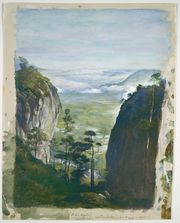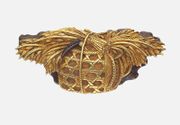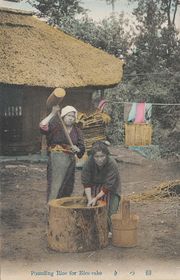Difference between revisions of "Rice"
Jump to navigation
Jump to search
(username removed) |
|||
| (10 intermediate revisions by 5 users not shown) | |||
| Line 1: | Line 1: | ||
| − | [[File: | + | [[File:Ceylon rice fields MFA.jpg|thumb|Ceylon rice fields<br>MFA# 26.784]] |
| + | [[File:Kanamono rice MFA.jpg|thumb|Kanamono with rice sheaves; MFA# 11.5606]] | ||
== Description == | == Description == | ||
| − | A thin stalk of the ''Oryzo sativa'' [ | + | A thin stalk of the ''Oryzo sativa'' [[grass]]. Rice straw is used for papermaking. During World War II it was also used for coarse rope because of the shortage of other [[bast fiber|bast fibers]]. |
| − | See also [ | + | See also [[rice flour]], [[rice husk]], [[rice oil]], [[rice paper]], [[rice starch]], and [[rice wax]] |
| − | [[File: | + | [[File:Pounding rice photo MFA.jpg|thumb|Pounding rice<br>MFA# 2002.7789]] |
== Synonyms and Related Terms == | == Synonyms and Related Terms == | ||
rice straw; arroz (Esp.) | rice straw; arroz (Esp.) | ||
| − | == | + | == Physical and Chemical Properties == |
| − | Fiber width = 6-12 microns; straight with tapering ends; Striations are fine and well-spaced; Parenchymal cells have a serrated edge. | + | * Fiber width = 6-12 microns; straight with tapering ends; |
| + | * Striations are fine and well-spaced; | ||
| + | * Parenchymal cells have a serrated edge. | ||
| − | + | For paper fiber characteristics see [[straw]]. | |
| − | |||
| − | |||
== Additional Images == | == Additional Images == | ||
<gallery> | <gallery> | ||
| + | File:Rice.harvest_USDA_ARS.jpg|thumb|Rice harvesting | ||
| + | File:ricewp2.jpg|thumb|Mature rice | ||
File:U.S.Long.grain_Rice_USDA_ARS.jpg|U.S. long grain rice | File:U.S.Long.grain_Rice_USDA_ARS.jpg|U.S. long grain rice | ||
File:Rice.varieties.comp_USDA_ARS.jpg|Rice varieties | File:Rice.varieties.comp_USDA_ARS.jpg|Rice varieties | ||
File:rice_straw_det.jpg|Rice straw paper | File:rice_straw_det.jpg|Rice straw paper | ||
| + | File:Rice 40x.jpg|Rice paper pulp stained with Graff "C" stain | ||
| + | File:Rice 40x smallvessels.jpg|Rice paper pulp stained with Graff "C" stain | ||
</gallery> | </gallery> | ||
| + | == Resources and Citations == | ||
| + | * T.Collings, D. Miller, 'The Identification of Oriental Paper Fibers' ''The Paper Conservator'', vol 3, 1978. | ||
| − | + | * G.S.Brady, ''Materials Handbook'', McGraw-Hill Book Co., New York, 1971 Comment: p. 669 | |
| − | |||
| − | * | ||
| − | * | + | * Silvie Turner, ''Which Paper?'', Design Press, New York, 1991 |
* ''Fairchild's Dictionary of Textiles'', Phyllis G.Tortora, Robert S. Merkel (eds.), Fairchild Publications, New York City, 7th edition, 1996 | * ''Fairchild's Dictionary of Textiles'', Phyllis G.Tortora, Robert S. Merkel (eds.), Fairchild Publications, New York City, 7th edition, 1996 | ||
Latest revision as of 16:09, 25 August 2022
Description
A thin stalk of the Oryzo sativa Grass. Rice straw is used for papermaking. During World War II it was also used for coarse rope because of the shortage of other bast fibers.
See also Rice flour, Rice husk, Rice oil, Rice paper, Rice starch, and Rice wax
Synonyms and Related Terms
rice straw; arroz (Esp.)
Physical and Chemical Properties
- Fiber width = 6-12 microns; straight with tapering ends;
- Striations are fine and well-spaced;
- Parenchymal cells have a serrated edge.
For paper fiber characteristics see Straw.
Additional Images
Resources and Citations
- T.Collings, D. Miller, 'The Identification of Oriental Paper Fibers' The Paper Conservator, vol 3, 1978.
- G.S.Brady, Materials Handbook, McGraw-Hill Book Co., New York, 1971 Comment: p. 669
- Silvie Turner, Which Paper?, Design Press, New York, 1991
- Fairchild's Dictionary of Textiles, Phyllis G.Tortora, Robert S. Merkel (eds.), Fairchild Publications, New York City, 7th edition, 1996









